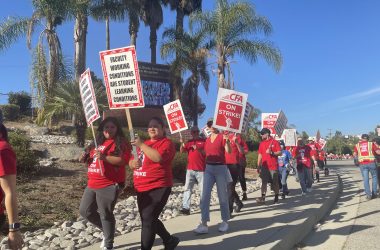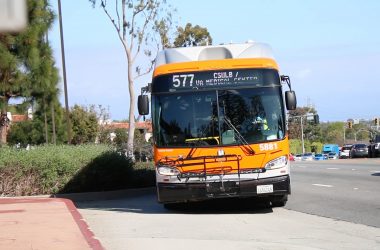A 10 percent fee increase for the California State University system will be voted on by the board of trustees Tuesday at the Office of the Chancellor in Long Beach.
CSU Chancellor Charles Reed defended his recommendation for the fee increase in a teleconference on Thursday, saying the state’s “economic meltdown” made an increase in student fees a difficult but necessary choice.
The possible $306-per-year increase — which would bring in approximately $130 million in new revenue for the CSU system — comes as a result of stagnant state funding brought on by projections of a bleak budget outlook.
The fee increase will be applied to the base state university fee that all CSU students pay. Currently, it is $1,524 for undergraduate students taking more than seven units.
According to Reed, about 160,000 students will be spared from the effects of the fee increase.
“Students whose families make less than $75,000 will see no fee increase,” he said. “The fee increase will be covered by grants and other financial aid.”
Reed said 80 percent of CSU students will receive some sort of financial aid to help offset the increase. He also said that the CSU will continue other measures to “tighten up” its operations.
These measures include hiring freezes on all campuses — excluding campus health centers and police departments — and a salary freeze on all presidents, vice presidents, the chancellor and vice chancellors.
Plans put in place last year to scale back CSU enrollment by 10,000 students, though, have not come to fruition.
“Admissions have been overwhelmed with eligible students,” Reed said.
He said schools will continue offering larger classes but that students will still struggle getting the classes they need to take.
“It will just be more crowded,” Reed said. “The alternative is to shut the door and not come at all, not allow any incoming students and not have student services. That’s the alternative.”
The state budget outlook could become worse after the May 19 special election.
Officials are currently anticipating an $8 billion gap between expected and actual tax revenue for the state, according to Judy Heiman, principal fiscal and policy analyst for the Legislative Analyst’s Office. But Heiman said that gap could grow to be at least $14 billion if voters reject all of the propositions in the election.
If California voters reject the six budget-related propositions, Heiman said, the Legislature would have to make deeper cuts in state funding later this month when lawmakers revise the 2009-2010 budget.
State funding for the CSU, which accounts for about two thirds of the system’s funds, dropped by about 1 percent between the 2008-2009 and the 2009-2010 budgets. Lawmakers plan on plugging that funding hole with funds from the American Recovery and Reinvestment Act, leaving the CSU with essentially level funding between this year and the next.
Student fees will account for about $1.4 billion of the CSU’s funds for 2009-2010.
This story was updated at 5:29 p.m. on May 11.



